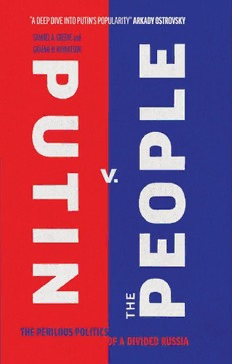
Putin v. the People: the Perilous Politics of a Divided Russia PDF
Preview Putin v. the People: the Perilous Politics of a Divided Russia
putin v. the people i ii Samuel A. Greene and Graeme B. Robertson e p l u p v. t o i e n p e h t The Perilous Politics of a Divided Russia YALE UNIVERSITY PRESS NEW HAVEN AND LONDON iii To Elyana and Anya —SG To Ceci, Tomás and Mili —GR Copyright © 2019 Samuel A. Greene and Graeme B. Robertson All rights reserved. This book may not be reproduced in whole or in part, in any form (beyond that copying permitted by Sections 107 and 108 of the U.S. Copyright Law and except by reviewers for the public press) without written permission from the publishers. For information about this and other Yale University Press publications, please contact: U.S. Office: [email protected] yalebooks.com Europe Office: [email protected] yalebooks.co.uk Set in Adobe Caslon Pro Regular by IDSUK (DataConnection) Ltd Printed in Great Britain by TJ International Ltd, Padstow, Cornwall Library of Congress Control Number: 2019932772 ISBN 978-0-300-23839-6 A catalogue record for this book is available from the British Library. 10 9 8 7 6 5 4 3 2 1 iv contents Acknowledgments vii 1 The People and Vladimir Putin 1 2 The Kremlin under Fire 16 3 The Russian Spring 52 4 The Gatherer of Lands 87 5 Putin’s Greengrocers 122 6 Russia at War 159 7 Russia’s Putin 196 Dramatis Personae 234 Endnotes 252 Index 274 v vi acknowledgments We are grateful to the many people who have contributed to our thinking on the issues addressed in this book. Though too numerous to list individually, we greatly appreciate the insight and support of all of the colleagues, students and friends who continually challenge and shape our perspec- tives. We are particularly grateful to a number of people who gave selflessly of their time, reading and commenting in detail on this book as it took shape, including: Charles Clover, Maria Lipman, Cecilia Martinez-Gallardo, Peter McKellar, Silviya Nitsova, Sarah Oates, Roland Oliphant, Roberto Palacios, Gulnaz Sharafutdinova, Marat Shterin, Regina Smyth, Tim Walker, Jonathan Weiler and Ilya Yablokov. We are grateful to the Smith Richardson Foundation for financial support for the surveys on which much of this book is based. Special thanks go to Svetlana Koroleva and Alexei Levinson at the Levada Center, and to Elena Koneva, for helping to make our research possible. And a debt of grati- tude is owed to the entire team at Yale University Press, for helping to turn an idea into a book. Much of what works in this volume is down to the generosity and goodwill of all these people and more. Whatever does not work, however, remains the exclusive responsibility of the authors. vii viii ONE the people and vladimir putin Vladimir Putin is a popular man. He is also a dictator. That is not a contradiction. Putin has been the dominant figure in Russian politics since he first emerged on to the public stage twenty years ago. He has served fourteen years in his current job as president and another four as prime minister. He has survived economic booms and busts. He has led Russia through war and sanctions, through huge street protests and the horrors of terrorism. His power has rarely been challenged. Putin’s presence has seemed inevitable, a fixed point in a changing world. As other political leaders have come and gone, Putin has remained. How does he do it? Being a dictator helps. The president of Russia sits at the top of a huge coercive machine dedicated to policing and controlling. Putin has used the vast power of the Russian state’s repressive apparatus to intimidate would- be rivals and to expropriate, imprison or exile opponents. Other challengers have been even less fortunate. Some of those who were Putin’s most vocal critics when we began this research did not survive to press day. 1
